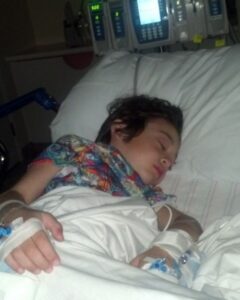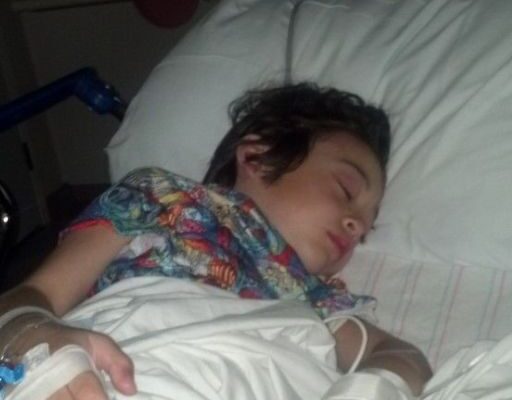There’s something unreal about watching your child sleep in a hospital bed.

The wires, the machines, the constant beeping—it all blurs together until you can’t tell what’s normal and what’s emergency anymore. You sit there, staring at every tiny movement, trying to convince yourself that if you just watch closely enough, you’ll catch whatever the doctors might miss.
He’s only seven.
Too small to understand what’s happening, but old enough to ask, “Mom, am I gonna be okay?” with a tremble in his voice that wrecks you.
The hardest part, though, is knowing that there’s nothing I can do. No magic words, no touch that will make him better. I can’t make the machines stop beeping, or the doctors come in with good news, no matter how much I want to.
I remember how normal everything felt just a few days ago. We had spent the afternoon at the park, him laughing as he ran around, pretending to be a superhero, chasing after me like I was the villain. But then the cough started, and within hours, he couldn’t catch his breath. What seemed like a cold turned into something far worse. The hospital visits, the tests, the waiting… and now, here we are, in the sterile, cold silence of a hospital room, watching our world hang in the balance.
The worst part is the uncertainty. We don’t know what’s wrong, not yet. They’ve done so many tests, run so many scans, but everything comes back inconclusive. The doctors keep telling me they’re doing everything they can, that they’ll get to the bottom of it soon. But I know better than to believe in empty reassurances. They say those things to make you feel better, but deep down, I can see the worry in their eyes. They don’t know either.
As I sit there, clutching his small hand, praying for answers, the door opens. I don’t look up right away; I don’t want to face the doctor with that look on his face—the one that always tells you everything without saying a word. But he’s there anyway, standing at the threshold, his face as serious as I’ve ever seen it.
“Mrs. Collins,” he says gently. His voice is soft, but the words feel like they hit me like a hammer. “We’ve received the results from the latest round of tests.”
I brace myself. The world feels like it’s slowing down, my heartbeat thudding in my ears. I force myself to take a deep breath, trying to steady myself. I can’t fall apart now. Not for him.
“Is it… is it something serious?” I manage to whisper, my voice breaking at the edges.
The doctor hesitates for a moment. “We’re still waiting on some final results, but we believe we’ve pinpointed what’s going on.” He looks at my son, who is still sleeping soundly despite the chaos of the room around him. Then he looks back at me. “It’s a rare condition, but we have a plan.”
I don’t know what I expected him to say, but somehow, the words he chose to share brought more relief than I thought possible. There was something solid in his tone, something that told me we weren’t entirely lost yet.
“I’ll explain everything in detail, but the most important thing right now is that your son is going to be okay,” the doctor continues. “He’s going to need a series of treatments over the next few weeks, but the prognosis is good.”
I feel the tension in my chest begin to loosen, the weight that I hadn’t even realized I’d been carrying easing up a bit. He’s going to be okay. My baby is going to be okay.
I feel like a breath I didn’t know I was holding rushes out of me in an almost tangible way. The room suddenly feels a little brighter, the air a little lighter. I nod, trying to absorb what he’s saying, but my heart is too full to focus on the details just yet. I only hear one thing: he’s going to be okay.
The doctor stays with me for a few more minutes, explaining the next steps and what treatments will look like. But it’s all a blur. What I really need to know is that my son will make it through. He’ll get better. And that, for now, is enough.
Later, as I sit beside his bed once again, I let the tears come. Quiet, silent tears that don’t need to be explained. Relief is a strange thing—it builds up over days, weeks, and months, and then, when you finally feel it, it overwhelms you.
A few days later, we’re discharged. The treatment begins, and the weeks that follow are a rollercoaster of emotions. There are ups and downs, but through it all, my son remains a fighter. His strength reminds me every day of the power of hope, of the importance of not giving up, no matter how dark things seem.
And then, just as the worst of it starts to feel behind us, a surprise comes—a twist I wasn’t prepared for.
A letter arrives at our door. It’s from the hospital, and it’s addressed to me, personally. At first, I’m confused. What could they want now? I open it cautiously, not sure what to expect.
The letter is from the head of the department, explaining that there was an error in some of the initial results. What they had originally diagnosed as a rare condition, they now believe to be a much more common, treatable illness. The tests had been mixed up, and what they thought was serious was actually something that could be easily managed with the right care.
At first, I don’t know how to feel. Relief, yes, but also confusion. Why had they made this mistake? Why had they let us go through all that worry? And most of all, why hadn’t they caught it sooner?
I call the doctor, and we talk it through. He apologizes for the error, and though he’s genuinely regretful, I can tell he’s a bit embarrassed. “We’re going to take full responsibility for the mistake,” he says. “But I promise you, your son is well on the road to recovery. He’s going to be just fine.”
It’s not an easy pill to swallow. The emotional toll, the fear of losing my child, the anxiety of not knowing what was really happening—it all feels like it’s been turned upside down. But as the weeks go by, and I watch my son bounce back, healthier and stronger than ever, I realize something important.
Sometimes, life doesn’t go the way we expect it to. We go through hardships, we endure pain, and we think the worst is always just around the corner. But then, when we least expect it, we find our way through. We come out on the other side—stronger, wiser, and maybe even a little more humble.
The lesson I learned from this? Trust. Trust in the process, trust in the people around you, but most importantly, trust in the strength we all have within ourselves. Life will throw challenges your way, but if you keep going, if you keep fighting for what matters, you will get through it. And sometimes, the twists life throws at you might just be the way forward.
So, if you’re facing a challenge, no matter how big or small, keep moving forward. The road might be bumpy, but there’s always hope on the horizon. And sometimes, things turn out better than you ever imagined.
Please share this post with someone who needs a little hope today. We’re all in this together, and sometimes, hearing someone else’s story is exactly what we need to keep going.



